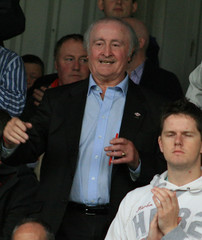CHARLIE HURLEY: “THE GREATEST CENTRE HALF THE WORLD HAS EVER SEEN”...Mark Metcalf (Sportsbooks)
Mark Metcalf will, I hope, forgive me for having started his book on Charlie Hurley on page 187.
It was not that I had no interest in the earlier chapters.
When I got round to them, I devoured them, too. Metcalf offers a comprehensive account of Charlie’s early life and cannot be faulted for lack of detail about a brilliant career played predominantly outside the top flight. But what I really wanted to – had to – read first was Chapter Thirteen: Bust-up with Baxter.
For just as Charlie was King – if that is not an odd title for a son of the Irish Republic – Slim Jim, as he no longer was when he joined us, was also a hero of my generation of fans. Or maybe an anti-hero. Yes, he was past his best. True, stories of his nocturnal exploits swept the North East. But young people look up to rebels.
A friend who cared little for football went with me to one match at Blackpool and marvelled at one short sequence when Baxter tracked an opposing player all over the field until the opportunity arose to exact revenge for some earlier insult or injury.
Charlie saw Baxter’s genius. But he loathed him for his attitude, for letting himself go and for wasting an immense talent. And he saw his resolve, as club captain, to maintain hardworking traditions and a keen sense of professionalism undermined by the manager, Ian McColl. For McColl, “the sun shone out of Baxter’s backside, so Slim could do no wrong.”
In one practice match, Charlie became so angry with Baxter that he “went straight through him”.
“Baxter,” he told the author, “had a magic left foot, great footballer on his day but he was an animal.”
This is gripping stuff. far removed from the safe, sanitised gibberish that too often masquerades as truth in ghosted autobiographies. Metcalf’s book began as an independent project but turned in the making into an authorised biography; even so, it is written with welcome journalistic rigour.
And while I found the Baxter revelations of special interest, the rest of the book offers a superb insight into Charlie as player, manager, family man and role model (if we leave aside the dubious example set by seeking to injure a teammate in training).
We learn a lot about Charlie’s boyhood up in Essex after being moved, as a baby, from his native Cork City. There was a narrow escape from death when a German doodlebug crashed into a garden, killing the eight-year-old pal he’d just been playing with. And there was his development as a footballer of stunning promise, his start in league football at Millwall and the hesitant move to the North East to embark (with a 7-0 defeat at Blackpool in the first relegation season Sunderland endured) on his fabulous playing career in the red and white stripes of SAFC and the green of Ireland.
For us, he’s the greatest centre half the world has ever seen, with no need for Metaclf’s quotation marks. For Millwall fans, he’s the greatest player they’ve ever seen at their club. Post-Sunderland, the spell at Bolton saw the career winding down. He showed promise as a manager of Reading, and could probably have developed into a
successful boss had he taken advantage of one of two approaches from Sheffield United. And he has, throughout the years out of the game, maintained his huge affection for Sunderland – a place he first went to with the deepest of reluctance – and its club, and for the fans who come from a catchment area stretching back from the mouth of the Wear throughout County Durham and beyond.
Metcalf, a Sunderland nut himself, avoids the breathless prose of many football books, and tells the Hurley story with commendable attention to detail.
I am not sure that every reader will share the Sunderland or Irish Republic fan’s interest in the minutiae of Hurley performances on the field, recorded here at some length. And there are aspects of Charlie’s life that I would have liked to see explored in more depth. What did a man born in Ireland to a thoroughly Irish family make of growing up in southern England and being called up by Her Majesty’s Armed Forces? The portrait of Charlie as family man could have been more complete; his elder daughter, born in Sunderland, hints at some father-daughter conflict when she was a teenager, but the reader is left to wonder what inspired it, how serious it was and how both dealt with it.
But these are minor criticisms. Any Sunderland fan – and also any Millwall and Bolton supporter, not to mention the Irish – should find it a rewarding read. It will also appeal to many lovers of football who support none of those teams. It is a book I wish I had written.
* That’s Charlie again (above), with Mark Metcalf (to the right) at a book-signing session. One of the author’s acknowledgements is to Dave Hillam, who has been described as “the greatest Sunderland AFC historian since Arthur Appleton” and who, I understand, provided invaluable assistance to the author in his researches for the book. Dave, sadly, died earlier this year, and is sorely missed by friends, family and an army of fans who, whether or not they met him, profited from his knowledge and dedication.
***** ***** ***** ***** ***** ***** *****
** please see also: A tribute to Dave Hillam
***** ***** *****
Red, white….and green
*** *** *** *** ***
In the court of King Charlie
***** ***** ***** ***** *****
And if I’ve encouraged you to buy the book, get it here


